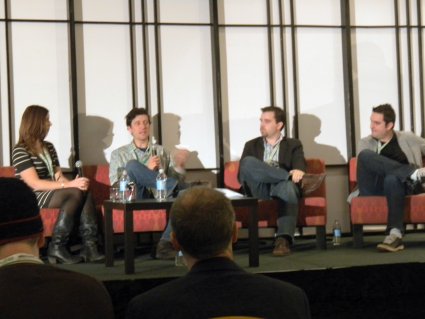With a handful of powerhouse development companies dominating the gaming space, what room is there for small and medium sized development groups? If Facebook has its way and drops Zynga for refusal of accepting its Facebook credit system, there could be plenty of room. But it probably won’t come to that extreme as Zynga will probably accept 70 percent of a very lucrative pie, Facebook’s audience, versus nothing.
The timing of this news was met by huge applause from the group of small- and medium-sized developers and publishers that attended the Social Gaming Summit in San Francisco. One panel discussion focused specifically on the market of small and medium sized developers.
- Atul Bagga, ThinkEquity Research (moderator)
(From left to right in photo)
- Donna Powell, Meteor Games
- James Currier, Wonderhill
- Greg Thomson, Tall Tree Games
- Joel Auge, HitGrab
All developers on the panel worked for shops with less than 40 people on staff.
Here are some of the issues that came up in the discussion:
- Placing games on Facebook allows game developers to attract non gamers and bring them into a gaming space.
- HitGrab claims that they have 70-80% retention after day one of acquiring a player versus Zynga who claimed in another session that 30-50% was a good rate of retention for their games.
- There are some commonplace engagement tricks like spinning wheels and lotteries. All of those were used heavily with NeoPets.
- A dotcom connection (a space outside of Facebook) is one way to engage users outside of a social community.
- Build an emotional tie with your product. Movies, TV, and music do that. Game developers need to think of ways to emotionally connect their gamers to the product.
- Ease of developing social game companies started about 18 months ago when it became so viable on Facebook. At that time there was such a low cost of customer acquisition and high retention.
- The big disruption isn’t Facebook, it’s virtual currencies. Virtual currencies is the business and if you focus on that, then small and medium sized companies can thrive.
- HitGrab said that Zynga didn’t want to copy its Mousehunt game because they didn’t want to make the investments that it would require in design, game mechanics, and how deeply HitGrab gets involved with retaining players in its games.
- Getting something to go viral is something you have to do every single day. It’s not something that just happens.
- Intellectual property moving to virtual spaces and gaming have all failed in Second Life and most of them failed in other locations. A good example is Scrabulous, which did very well on Facebook, and then they got kicked off and the official Scrabble tried to succeed and failed.
For more coverage from the Social Gaming Summit:
- Playing the Distribution Game
- Social Gaming Summit: How social can casual games get?
- Social Gaming Summit: Is gaming overseas more or less lucrative?
Do you think Zynga will completely cower to Facebook’s pressure? Zynga definitely needs Facebook, but do you think Facebook needs Zynga?




